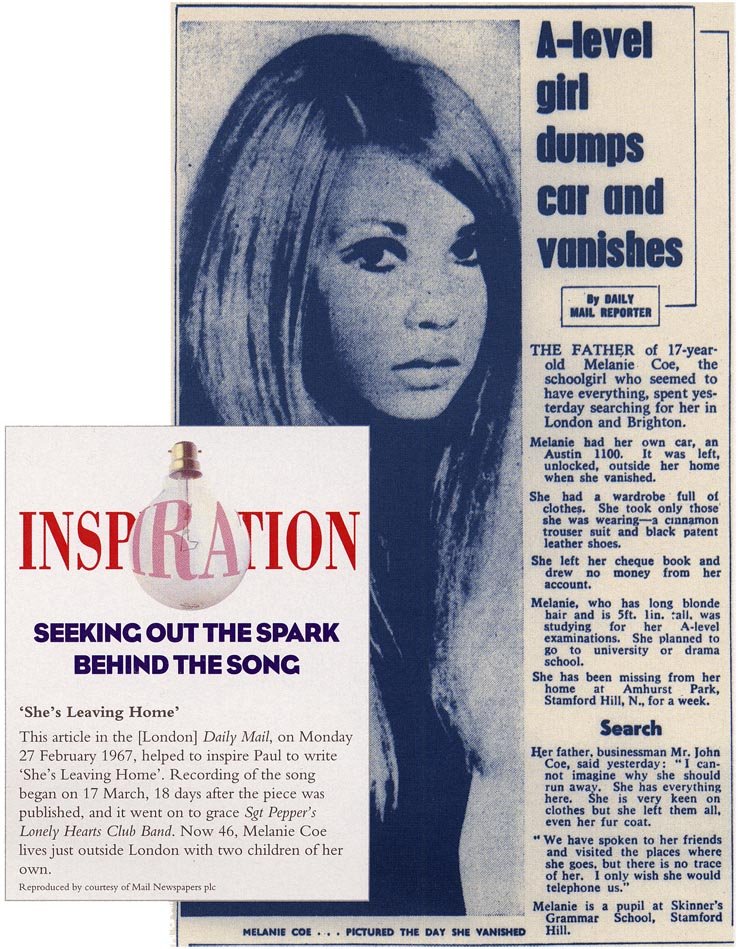
Monday, February 27, 1967
The Daily Mail publishes an article about a teenage runaway
Last updated on January 1, 2024

Monday, February 27, 1967
Last updated on January 1, 2024
Article Feb 25, 1967 • Beatles photoshoot with Henry Grossman
Interview Feb 25, 1967 • Paul McCartney interview for Melody Maker
Article Feb 27, 1967 • The Daily Mail publishes an article about a teenage runaway
Session Feb 28, 1967 • Recording "Lucy In The Sky With Diamonds"
Article March 1967 • Paul McCartney helps out International Times financially
Officially appears on Sgt. Pepper's Lonely Hearts Club Band (UK Mono)
On February 27, 1967, The Daily Mail published an article about a young girl named Melanie Coe, who had left home and had been missing for a week. This event inspired Paul McCartney to write the song “She’s Leaving Home“, which was recorded on March 17 to be included on the “Sgt. Pepper’s Lonely Hearts Club Band” album.
In his book “The Lyrics: 1956 to the Present“, Paul mentioned that “The Wednesday Play“, a weekly television show, also influenced him to write the song.
John and I wrote ‘She’s Leaving Home’ together. It was my inspiration. We’d seen a story in the newspaper about a young girl who’d left home and not been found, there were a lot of those at the time, and that was enough to give us a story line. So I started to get the lyrics: she slips out and leaves a note and then the parents wake up and then… It was rather poignant. I like it as a song, and when I showed it to John, he added the Greek chorus, long sustained notes, and one of the nice things about the structure of the song is that it stays on those chords endlessly. Before that period in our songwriting we would have changed chords but it stays on the C chord. It really holds you. It’s a really nice little trick and I think it worked very well.
While I was showing that to John, he was doing the Greek chorus, the parents’ view: ‘We gave her most of our lives, we gave her everything money could buy.’ I think that may have been in the runaway story, it might have been a quote from the parents. Then there’s the famous little line about a man from the motor trade; people have since said that was Terry Doran, who was a friend who worked in a car showroom, but it was just fiction, like the sea captain in ‘Yellow Submarine’, they weren’t real people.
Paul McCartney – From “Paul McCartney: Many Years from Now” by Barry Miles, 1997
In addition to the newspaper report, I’m pretty sure another influence was The Wednesday Play. It was a weekly television play that often addressed ‘big’ social issues. It’s the kind of thing people would be discussing at the bus stop on Thursday morning. It was a very important part of the week. One of the most famous of these plays was Cathy Come Home, directed by Ken Loach. It’s a play about homelessness that a quarter of the UK population watched the night it was broadcast in November 1966.
When we recorded ‘She’s Leaving Home’ it was almost like a shooting script for The Wednesday Play. ‘Clutching her handkerchief / Quietly turning the backdoor key’. On one hand we have the narrator who’s describing the action (‘She’s leaving home’), and then there are a couple of people in the spotlight, a mini Greek chorus, who fade in and out (‘We gave her most of our lives’). There was a line in that style – ‘Is this all the thanks that we get?’ – which somehow didn’t make the final cut.
Paul McCartney – From “The Lyrics: 1956 to the Present“, 2021
I first heard the song when it came out and I didn’t realize it was about me, but I remember thinking it could have been about me. I found the song to be extremely sad. It obviously struck a chord somewhere. It wasn’t until later, when I was in my twenties, that my mother said, ‘You know, that song was about you!’ She had seen an interview with Paul on television and he said he’d based the song on this newspaper article. She put two and two together.
Melanie Coe – From Meet the Runaway Who Inspired Beatles’ ‘She’s Leaving Home’ (rollingstone.com), May 23, 2017
In one of the more astonishing coincidences in Beatles history, Coe had actually met the band more than three years before “She’s Leaving Home” was written, during their first appearance on the English television program Ready, Steady, Go! on October 4th, 1963. Then just 14 years old, she had been booked to compete in an on-air lip-synching contest. To pass the time during the hours of rehearsals, Coe and her young competitors chatted with the newly minted pop sensations, who had scored their third British Number One with “She Loves You” just a few months earlier. “At this point they were big, but they weren’t the huge success they were about to become,” she recalls. “Ringo was just adorable. He had all these rings on and he let us try them on. He was a lovely guy. So was George; he stood and chatted with us and asked us about our schools and what we were thinking of studying. They were both very sweet. Paul said hello and that was it, and I remember John was busy talking to some of the studio producers and directors and didn’t really acknowledge that we were there.”
Coe earned the top prize with her high-spirited miming to Brenda Lee’s “Jump the Broomstick,” and McCartney presented her with an autographed Beatles album. Unfortunately, the moment proved to be somewhat underwhelming. “I was very disappointed because there had been two shows before mine, and on both of those shows the girl that won went out on a date with the pop star. I thought I was going to have dinner date with the Beatles, so I was terribly disappointed with my prize!” she laughs now. What’s more, she was mortified when McCartney’s firm handshake nearly caused her false nails to come loose. “I don’t think I’d ever worn them before, but I wanted to have everything perfect. You can imagine what a treat that was for a 14-year-old girl to go on that show and spend a day with the Beatles.”
From Meet the Runaway Who Inspired Beatles’ ‘She’s Leaving Home’ (rollingstone.com), May 23, 2017
A-level girl dumps car and vanishes
THE FATHER of 17-year-old Melanie Coe, the schoolgirl who seemed to have everything, spent yesterday searching for her in London and Brighton.
Melanie had her own car, an Austin 1100. It was left, unlocked, outside her home when she vanished. She had a wardrobe full of clothes. She took only those she was wearing — a cinnamon trouser suit and black patent leather shoes. She left her cheque book and drew no money from her account.
Melanie, who has long blonde hair and is 5ft. lin. tall, was studying for her A-level examinations. She planned to go to university or drama school. She has been missing from her home at Amhurst Park, Stamford Hill, N., for a week.
Her father, businessman Mr. John Coe, said yesterday: “I cannot imagine why she should run away. She has everything here. She is very keen on clothes but she left them all, even her fur coat. We have spoken to her friends and visited the places where she goes, but there is no trace of her. I only wish she would telephone us.”
Melanie is a pupil at Skinner’s Grammar School, Stamford Hill.
From The Daily Mail – February 27, 1967

About “The Wednesday Play“, from Wikipedia:
The Wednesday Play is an anthology series of British television plays which ran on BBC1 for six seasons from October 1964 to May 1970. The plays were usually original works written for television, although dramatic adaptations of fiction (and occasionally stage plays) also featured. The series gained a reputation for presenting contemporary social dramas, and for bringing issues to the attention of a mass audience that would not otherwise have been discussed on screen.
Some of British television drama’s most influential, and controversial, plays were shown in this slot, including Up the Junction and Cathy Come Home. The earliest television plays of Dennis Potter were featured in this slot. […]
Director Ken Loach made ten plays in all for The Wednesday Play series. Two of them are among the best remembered of the entire run: an adaptation of Nell Dunn’s Up the Junction (3 November 1965), and the saga of a homeless young couple and their battle to prevent their children being taken into local authority care: Cathy Come Home (16 November 1966). The latter began Loach’s 13-year collaboration with Tony Garnett as his producer, although Garnett had been closely involved with Up the Junction as well.
Plays like Up the Junction though were controversial among more conservative viewers. The ‘Clean-Up TV’ campaigner Mary Whitehouse accused the BBC of portraying “promiscuity as normal” in Up the Junction and The Wednesday Play as featuring “Dirt, Doubt and Disbelief”. The writer on television Anthony Hayward quoted Garnett in 2006: “Mary Whitehouse was on the prowl, which was an added frisson, but it was actually very good free publicity and helped the ratings.” The “drama documentary” approach was criticised by television professionals who thought it was dishonest. In a Sunday Telegraph article published before its first repeat transmission Grace Wyndham Goldie complained that Cathy Come Home “deliberately blurs the distinction between fact and fiction … [viewers] have a right to know whether what they are being offered is real or invented.” Loach has admitted that “[w]e were very anxious for our plays not to be considered dramas but as continuations of the news” which preceded The Wednesday Play‘s slot.
The Beatles Diary Volume 1: The Beatles Years
"With greatly expanded text, this is the most revealing and frank personal 30-year chronicle of the group ever written. Insider Barry Miles covers the Beatles story from childhood to the break-up of the group."
We owe a lot to Barry Miles for the creation of those pages, but you really have to buy this book to get all the details - a day to day chronology of what happened to the four Beatles during the Beatles years!

Notice any inaccuracies on this page? Have additional insights or ideas for new content? Or just want to share your thoughts? We value your feedback! Please use the form below to get in touch with us.